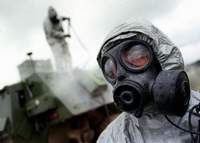The world is insecure against biological hazard
Biological hazard may be caused by three factors: infectious diseases, biological terrorism and genetically modified products

The popular problem of biological terrorism logically throws light on another serious problem, the problem of biological safety in separate countries and on the planet in general. The burning issue was touched upon at the First International Conference “Molecular Medicine and Biological Safety” in Moscow. Russia's Chief Sanitary Inspector Gennady Onischenko spoke at the conference and emphasized that biological safety is no longer the prerogative only of doctors and scientific community. The events of September 11, 2001 in the USA prove this is a global political problem. 
Biological hazard may be caused by three factors: infectious diseases, biological terrorism and genetically modified products.
Infectious diseases are a traditional menacing factor for the whole of mankind. However, its danger is decreasing as medicine develops. At the same time, the World Health Organization states that infectious diseases are rated second among factors causing mortality and are the number one reason entailing untimely death. Every year, over two billion people catch infectious diseases and 17 million of them die of these diseases.
Within the past years, not only medicine but even diseases themselves have registered progress in development. Latent infections become active and new forms of infections appear, remember SARS that seriously alarmed the world. At least 30 new infectious agents have become known within the past 30 years. At the same time, known pathogens grow stable against various medicines.
Experts register cross mutations of flu virus that turn not dangerous viruses into lethal. Two additional genes may make a flu virus lethal and a pandemic of such a disease may considerably reduce the population of the planet within a short period of time as it happened during the 1918 Spanish flu pandemic.
The world medical community realizes perfectly well that any particular country cannot solve the problem of infectious incidence independently; that is why the World Health Organization creates a system of global monitoring as the basis of biological safety of the country.
Variola is known as a highly contagious infection causing high lethality and leaving scars on the skin of those who survived after the disease in Middle Ages; the disease ravaged cities as sweepingly as plague in those times. It was in 1796 that British country doctor Edward Jenner suggested carrying out vaccination against variola. In 1958, the UN and the World Health Organization launched a crusade against variola in the world. The global vaccination campaign ended in the absolute triumph of mankind over the disease which was announced in 1980. That was the year when vaccination against variola was stopped. At the same very period it became clear that the disease may once again be very dangerous for people. Today, 60 percent of the planet's population has no immunity to variola.
Russia and the US think it is important first of all to create new vaccines, at least two, create new viricides, develop new methods for identification and detection of the pathogen to fight variola. Besides, it is important to make sure that no other country except Russia and the US have collections of the variola virus. Today, the biological hazard is extremely great; that is why governmental and international structures must take care that infections agents could not be stolen from places where they are studied, stored and produced.
Unfortunately, the situation with genetically modified food is distressing in Russia. The national genetic research program was stopped 15 years ago in 1989-1991. At the same time, production of genetically modified foodstuff is increasing in the world, and the Russian basket of goods greatly depends upon imported food. If we continue to ignore the situation with GM products the biological safety of the country may be seriously undermined.
The Russian population is basically ignorant of genetically modified components, and ignorance as a rule entails fear. According to an opinion poll conducted by Medmedia.ru, 64 percent of respondents would on no condition buy food containing genetically modified components.
Plants undergo genetic modification to make them stable against pesticides, plant pests, pathogenic organisms which finally increases the crop capacity and the price of foodstuffs. Genetically modified products cost less than their classical analogues. But this mechanism is secure if producers employ effective systems for control of quality and safety of genetically modified components. Many countries have adopted systems approved by the World Health Organization. Russian researchers have developed a national system adapted to Russia's conditions, and the system was approved by the World Health Organization as well. Starting with June 2004 in Russia, all products containing over 0.9 percent of GM components must be obligatorily marked as containing genetically modified components.
Subscribe to Pravda.Ru Telegram channel, Facebook, RSS!


